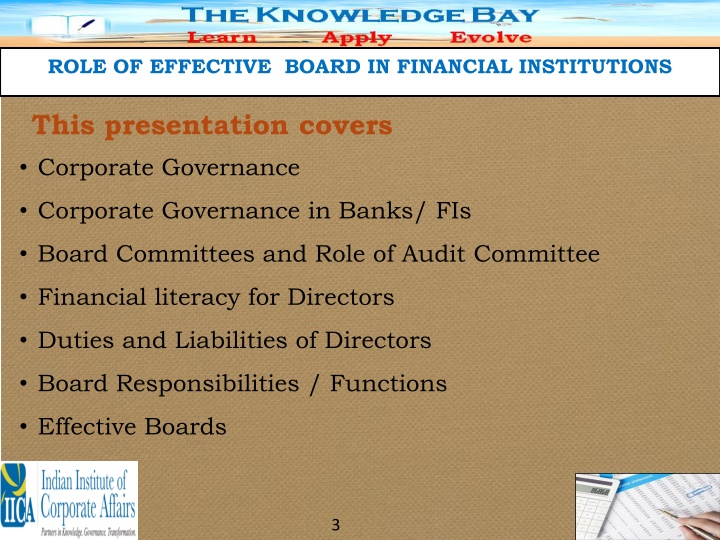
Role of Effective Board in Financial Institutions: Corporate Governance and Responsibilities
Explore the crucial role of effective boards in financial institutions, focusing on corporate governance principles, board committees, financial literacy for directors, duties and liabilities, board responsibilities, and functions. Learn about the National Bank for Agriculture and Rural Development (NABARD) and its board structure, activities, and governance practices. Gain insights into corporate governance, board accountability to shareholders, and wealth creation and protection.
Download Presentation

Please find below an Image/Link to download the presentation.
The content on the website is provided AS IS for your information and personal use only. It may not be sold, licensed, or shared on other websites without obtaining consent from the author. If you encounter any issues during the download, it is possible that the publisher has removed the file from their server.
You are allowed to download the files provided on this website for personal or commercial use, subject to the condition that they are used lawfully. All files are the property of their respective owners.
The content on the website is provided AS IS for your information and personal use only. It may not be sold, licensed, or shared on other websites without obtaining consent from the author.
E N D
Presentation Transcript
ROLE OF EFFECTIVE BOARD IN FINANCIAL INSTITUTIONS This presentation covers Corporate Governance Corporate Governance in Banks/ FIs Board Committees and Role of Audit Committee Financial literacy for Directors Duties and Liabilities of Directors Board Responsibilities / Functions Effective Boards 3
ROLE OF EFFECTIVE BOARD IN FINANCIAL INSTITUTIONS National Bank for Agriculture and Rural Development (NABARD) Set up under NABARD Act, 1981 A development bank Body corporate having perpetual succession Having share capital Management to vest in Board of directors Board managed 4
ROLE OF EFFECTIVE BOARD IN FINANCIAL INSTITUTIONS National Bank for Agriculture and Rural Development (NABARD) Board of Directors Chairman Managing Director Dy. Managing Director Directors (experts, RBI, from GoI, State Governments) Board Committees Audit Committee (ACB) Risk Management Committee (RMCB) Management Committee (for policy matters) (MC) Sanctioning Committee for loans Building Sub-Committee HR Sub-Committee IT Committee 5
ROLE OF EFFECTIVE BOARD IN FINANCIAL INSTITUTIONS NABARD s Activities Financing under various schemes to eligible borrower State Governments, Government entities, JVs, SPVs, Cooperatives, Corporates etc Institutional development of RFIs (RRBs, Cooperative banks, PACS etc Supervision (u/s 35 (6) of BR Act 1949) of State Cooperative banks, DCCBs, RRBs etc to ensure regulatory compliances and ensure strengthening of banks / institutions Creation of special funds (e.g. food parks fund, water shed development fund for specified activities etc. 6
ROLE OF EFFECTIVE BOARD IN FINANCIAL INSTITUTIONS CORPORATE GOVERNANCE (CG) Corporate governance is a system by which companies are directed and governed Board is at the centre stage of governance Board directs the company (management manages the company) Board controls the company and its management Board s accountable to the shareholders / stakeholders for creating, protecting and enhancing wealth / value / resources for the company and reporting to them on the performance in transparent manner. 7
ROLE OF EFFECTIVE BOARD IN FINANCIAL INSTITUTIONS FAIRNESS CORPORATE GOVERNANCE RESPONSIBILITY TRANSPRENCY ACCOUNTABILITY 8
ROLE OF EFFECTIVE BOARD IN FINANCIAL INSTITUTIONS Corporate Governance The conduct of businesss in accordance with shareholders desires, which generally is to make as much money as possible, while conforming to the basic rules of the society embodied in law and local customs. - Nobel Laureate Milton Friedman Corporate Governance is about promoting corporate fairness, transparency and accountability. -James D. Wolfensohn (Ninth President, World Bank) Corporate Governance is a system of structuring, operating and controlling a company with the following specific aims : Fulfilling long-term strategic goals of owners Taking care of the interests of employees A consideration for the environment and local community Maintaining excellent relations with customers and suppliers Proper compliance with all the applicable legal and regulatory requirements. -Cadbury Committee, U.K. 9 9
ROLE OF EFFECTIVE BOARD IN FINANCIAL INSTITUTIONS Principles of Corporate Governance - OECD Ensuring the basis for an Effective Corporate Governance Framework Rights of Shareholders and key Ownership functions Equitable treatment of Shareholders Role of Stakeholders in Corporate Governance Disclosure and Transparency Responsibilities of the Board 10
ROLE OF EFFECTIVE BOARD IN FINANCIAL INSTITUTIONS Functions carried out by Board Generally, the board of directors has overall responsibility for the governance of banks. The governance framework, which is followed by banks, must continuously be developed and reviewed by the bank. Framework implementation is essential for the bank. Apart from this, quality assessment has to be carried out by comparing the actual standards to the general rules. Directors have the responsibility of not only handling the organization but also playing a crucial role in managing the governance of the board. Contd . 11
ROLE OF EFFECTIVE BOARD IN FINANCIAL INSTITUTIONS Functions carried out by Board The board of directors are responsible for conducting annual general meetings and board meetings for the bank. The directors must ensure that time is recorded for board meetings as per the norms under the Companies Act 2013. However, the rules related to the recording of board meetings are developed by the Institute of company secretaries of India (ICSI) from time to time. A director has to be a leader and bring out effective, ethical structures on the board. These ethical structures have to be implemented throughout the bank. To ensure that senior management is performing their duties. The BOD must ensure that values are communicated through the banking channels. To ensure that all the employees in the bank follow the respective code of conduct. Ensure that the employees maintain compliance. To ensure that proper standards related to training are maintained in the bank. To ensure that the Chief Executive and Whole Time Director (WTD) act as a role model and implement values throughout the bank. To form a disciplinary committee for the bank and access the disciplinary action carried out for noncompliance with certain norms. To maintain an effective system of feedback within the banking framework. 12
ROLE OF EFFECTIVE BOARD IN FINANCIAL INSTITUTIONS The role of board of directors broadly relate to Strategies Corporate Governance Financial Management Relationship with senior management Role of board also includes Setting up a Vision and Mission. Strategic direction, policy and advice. Overseeing implementation of its policies. Appointment and evaluating the performance of CEO and senior management. Risk management and mitigation. Ensuring stakeholders engagement and relationships 13
ROLE OF EFFECTIVE BOARD IN FINANCIAL INSTITUTIONS What can be the responsibilities of a board / Directors To contribute to the business of the company through their knowledge and skills To advise on such matters as need their attention and influence To critically analyze the performance and operations of the company To be able to offer their professional expertise in the relevant field To establish sound business principles and ethics To act as a mentor to the management 14
ROLE OF EFFECTIVE BOARD IN FINANCIAL INSTITUTIONS Board Control tasks Fashion a leadership structure that allows the board to work effectively and collaboratively as a team, unified in support of the enterprise. Recruit members who collectively bring a balance of expertise, skills, experience, and perspectives and who exhibit irreproachable independence of thought and action. Build, over time, a nuanced and broad understanding of all matters concerning the strategy, risk appetite, and conduct of the firm, and an understanding of the risks it faces and its resiliency. Appoint the CEO and gauge top talent in the firm, assuring that the CEO and top team possess the skills, values, attitudes, and energy essential to success. Take a long-term view on strategy and performance, focusing on sustainable success. Respect the distinction between the board s responsibilities for direction setting, oversight, and control, and management s responsibilities to run the business. Reach agreement with management on a strategy and champion management once decisions have been made. Challenge management, vigorously and thoughtfully discussing all strategic proposals, key risk policies, and major operational issues. Ensure that rigorous and robust processes are in place to monitor organizational compliance with the agreed strategy and risk appetite and with all applicable laws and regulations. Assess the board s own effectiveness regularly, occasionally with the assistance of external advisers, and share this assessment with the lead supervisor. 15
ROLE OF EFFECTIVE BOARD IN FINANCIAL INSTITUTIONS Board Management tasks Be accountable for the daily effectiveness of the control architecture. Ensure control professionals maintain a comprehensive view of the firm s risks, balancing prudence with encouragement of sustainable risk taking. Educate and inform directors on an ongoing basis. Focus the governance dialogue on the key issues and bring the board early into management s thinking on key decisions. Expose directors to a broad set of executives and employees, both informally and formally, so they get an unfiltered view of the company. Work continually on modeling and supporting a culture that promotes long-term thinking, discipline, and accountability. Encourage a culture of no surprises, the quick elevation of issues, toleration of mistakes, organizational learning, and punishment of malfeasance. Build a trust-based environment that supports critical challenge and is open to change. 16
ROLE OF EFFECTIVE BOARD IN FINANCIAL INSTITUTIONS BOARD COMMITTEES Efficient functioning of board Change in board processes Delegating specific responsibilities to smaller, specialized and more manageable committees More in-depth scrutiny and attention to key areas Successful implementation of board policies Facilitate onerous oversight responsibilities of board 17
ROLE OF EFFECTIVE BOARD IN FINANCIAL INSTITUTIONS MANDATORY BOARD COMMITTEES Companies Act, 2013 Audit Committee (ACB) Stakeholder Relationship Committee (SRC) Nomination & Remuneration Committee (NRC) Corporate Social Responsibility Committee (CSR) SEBI (LODR) Regulations, 2015 Risk Management Committee RBI Guidelines Risk Management Committee Fraud Monitoring Committee 18
ROLE OF EFFECTIVE BOARD IN FINANCIAL INSTITUTIONS COMPOSITION OF AUDIT COMMITTEE In Every Listed Company In Public Company with Paid up capital of INR 10 Crores or more or; Turnover of INR 100 Crores or more Outstanding Borrowings Deposits / Debentures exceeding INR 50 Crores or more Composition: Minimum 3 directors with majority of IDs (LODR-2/3rd IDs) Financial literacy / Loans / 19 19
ROLE OF EFFECTIVE BOARD IN FINANCIAL INSTITUTIONS FINANCIAL LITERACY FOR DIRECTORS Why and What Section 177 (2) of Companies Act, 2013 Majority of members of Audit Committee including its Chairperson shall be persons with ability to read and understand, the financial statements: Who Members Chairperson What is expected Ability to read financial statements Ability to understand financial statements 20
ROLE OF EFFECTIVE BOARD IN FINANCIAL INSTITUTIONS FINANCIAL LITERACY FOR DIRECTORS Why and What Regulation 18 of SEBI (LODR) Regulations, 2015 All members of Audit Committee shall be financially literate, and Atleast one member shall have accounting or related financial management expertise All members Includes Chairman Expertise in Accounting Financial management 21
ROLE OF EFFECTIVE BOARD IN FINANCIAL INSTITUTIONS FINANCIAL LITERACY FOR DIRECTORS Meaning of Financial Literacy Regulation 18(1) of SEBI (LODR) Regulations, 2015 Financial Literacy to mean the ability to read and understand basic financial statements, i.e., balance sheet, profit and loss account and statement of cash flow. (Almost same as under Company Law) 22
ROLE OF EFFECTIVE BOARD IN FINANCIAL INSTITUTIONS FINANCIAL LITERACY FOR DIRECTORS Expertise in Accounting or Financial Management Explanation 2, Reg. 18(1) A member shall be considered to have accounting or related financial management expertise if he or she possesses experience in finance or accounting, or requisite professional certification in accounting, or any other comparable experience or background which results in the individual s financial sophistication, including being or having been a chief executive officer, chief financial officer or other senior officer with financial oversight responsibilities. What makes a director acquire expertise: Possess experience in finance or accounting, or Requisite professional certification in accounting, or Any other comparable experience /background which results in individual s financial sophistication, or Includes being or been a CEO / CFO /senior officer with responsibility of financial oversight 23
ROLE OF EFFECTIVE BOARD IN FINANCIAL INSTITUTIONS FINANCIAL LITERACY FOR DIRECTORS Why Directors should be Financial Literate Discharging role as member of Board Exercise Powers of Board as per section 179 Independent judgment Financial oversight and internal financial controls Approval of financial statements; board report u/s 134 Risk management As part of audit committee Board report obligations Financial statements and disclosures Director s responsibility statement Other documents 24 24 24
ROLE OF EFFECTIVE BOARD IN FINANCIAL INSTITUTIONS OBJECTIVES OF AUDIT COMMITTEE What Audit Committee is expected to do: The audit committee assists the governing body in its oversight of: integrity of the organization s financial statements; internal control including internal control over operations, compliance with laws and regulations, and financial reporting; internal and independent auditor s qualifications, independence and performance; the organization s risk management and overall governance process; and organization s ethics and compliance program, which includes legal and regulatory requirements. 25
ROLE OF EFFECTIVE BOARD IN FINANCIAL INSTITUTIONS ROLE OF AUDIT COMMITTEE Overseeing financial reporting and disclosure processes Monitoring choice of accounting policies and principles Oversight of regulatory compliances and ethics Whistle blower & policies Discussing risk management policies with management 26
ROLE OF EFFECTIVE BOARD IN FINANCIAL INSTITUTIONS AUDIT COMMITTEE IN PSUs Critical component to enhancing entity s governance and oversight PSUs require : Heightened transparency Public scrutiny Accountability to exchequer Government audit Internal controls and processes Tool for Government 27
ROLE OF EFFECTIVE BOARD IN FINANCIAL INSTITUTIONS AUDIT COMMITTEE FUNCTIONING ACB Effectiveness Integrity and attitude of Board including Committees Role of Senior / Top Management Independence Overseeing processes relating to : Financial risks Internal controls External audit hindrances example, covid Compliances legal /tax / financial reporting / internal / external 29
ROLE OF EFFECTIVE BOARD IN FINANCIAL INSTITUTIONS AUDIT COMMITTEE FUNCTIONING ACB Expectations From Board / Management Co-operation @ 360 degree To take ACB and its functioning seriously and in good faith Direction to top management and KMPs Seriousness in compliances - in letter and spirit Implementation issues Reporting concerns issues and timeliness Formulation of policies and their implementation No personal agenda 30
ROLE OF EFFECTIVE BOARD IN FINANCIAL INSTITUTIONS AUDIT COMMITTEE FUNCTIONING Board Expectations from ACB Oversight functions Expect lesser issues travel to board No negative comments on operations and compliances (but never to be promised by independent ACB) Audit management Strengthening of internal controls Because of ACB, lesser regulatory interventions Cooperative as per management wishes Not to become a super auditor 31
ROLE OF EFFECTIVE BOARD IN FINANCIAL INSTITUTIONS RBI guidelines for Corporate Governance in Banks Under Board for Financial Supervision (BFS) 3 major Committees Advisory group on CG (Dr. R H Patil, Chairman) Advisory group on banking supervision (Mr. M.S. Verma, Chairman) Consultative group of director of banks / FIs (Dr. A.S. Ganguly, Chairman) 32
ROLE OF EFFECTIVE BOARD IN FINANCIAL INSTITUTIONS How to enhance corporate governance in banking / FIs Board members should be qualified for their positions, have a clear understanding of their role in corporate governance and be able to exercise sound judgment about the affairs of the bank The board of directors should approve and oversee the bank s strategic objectives and corporate values that are communicated throughout the banking company. The board of directors should set and enforce clear lines of responsibility and accountability throughout the organisation The board should ensure that there is appropriate oversight by senior management consistent with board policy The board and senior management should effectively utilise the work conducted by the internal audit function, external auditors, and internal control functions 33
ROLE OF EFFECTIVE BOARD IN FINANCIAL INSTITUTIONS How to enhance corporate governance in banking / FIs The board should ensure that compensation policies and practices are consistent with the bank s corporate culture, long-term objectives and strategy, and control environment The bank should be governed in a transparent manner The board and senior management should understand the bank s operational structure, including where the bank operates in jurisdictions, or through structures, that impede transparency A role of supervisors to promote strong corporate governance by reviewing and evaluating a bank s implementation of the sound principles set forth To promote an environment supportive of sound corporate governance 34
ROLE OF EFFECTIVE BOARD IN FINANCIAL INSTITUTIONS Governance in Banks / FIs Code of conduct Crucial governance values Timely resolution Governance framework Do s and don'ts Policy based framework Whistle blowing in banks - framework, implementation and audit Basic tenets of whistle blowing : Access the standards of damage that are caused to the bank. Any form of concern can be addressed by the bank, which relates to disclosures. Any information provided by the whistleblower must be at all times kept confidential. The board is responsible for carrying out any form of action under the whistleblower policy. An informal and thorough investigation must be conducted once information is revealed related to mismanagement. 35
ROLE OF EFFECTIVE BOARD IN FINANCIAL INSTITUTIONS Board responsibilities leading to Governance of banks /FIs Conflicts of Interest Develop a risk framework for the management and the organization Management of the seniors of the company Duties of Directors on Governance for Banks Board Committees Audit Committee of the Board Risk Management Committee Nomination and Remuneration Committee Stakeholder relationship committee. 36
ROLE OF EFFECTIVE BOARD IN FINANCIAL INSTITUTIONS Risk Management in Banks / FIs Increased focus on risk governance There must be robust RM framework Policies Procedures Reviews Enhanced / aligned wrt external environment and business processes Identify, measure, monitor and manage critical risks Credit Risk management Market risk stress testing, interest rate risk, valuation, impact on economic value of equity etc Operational risk internal controls & system, self assessment, business continuity, compliance risk Risk ownership at board level Risk function operational and compliance Control function risk focused assurance to board Also address conduct risk based on business Transactional risks Compliances risks Risk management audit 37
ROLE OF EFFECTIVE BOARD IN FINANCIAL INSTITUTIONS Principles of good corporate governance for board of directors The board should exercise leadership, enterprise, integrity and judgment in directing the corporation so as to achieve continuing prosperity for the corporation and to act in the best interest of the business enterprise in a manner based on transparency, accountability and responsibility. The board should ensure that through a managed and effective process board appointments are made that provide a mix of proficient directors, each of whom is able to add value and to bring independent judgment to bear on the decision-making process The board should determine the corporation's purpose and values, determine the strategy to achieve its purpose and to implement its values in order to ensure that it survives and thrives, and ensure that procedures and practices are in place that protect the corporation's assets and reputation The board, should monitor and evaluate the implementation of strategies, policies, management performance criteria and business plans 38
ROLE OF EFFECTIVE BOARD IN FINANCIAL INSTITUTIONS What constitutes an exemplary board Well diversified Balanced Right sized with right people Board diversity ideally comes from / in terms of Knowledge Experience / back ground Gender Mix of executive and non-executive 39
ROLE OF EFFECTIVE BOARD IN FINANCIAL INSTITUTIONS Attributes of an effective board Optimum utilization of time Optimum utilization resources Team building and leadership Board evaluation Well informed board No conflict of interest Board processes of an effective board Transparency in decision making Open, free and frank discussions without worrying for disagreements Participation by all board members Dissents, if any to be respected, recorded and considered in overall interest of company Participation by all board members to be encouraged 40
ROLE OF EFFECTIVE BOARD IN FINANCIAL INSTITUTIONS Steps taken by Board to enhance board effectiveness and culture A greater focus by the board upon their role of oversight of legal compliance. An increased emphasis on developing a tone at the top that reflects corporate citizenship attributes Effective whistle-blowing procedures that encourage the early identification of misconduct. Audits of internal controls related to culture and company reputation. Codes of ethics and conduct being rigorously reviewed by committees and boards. Improvements in director induction ensuring that directors have an increased knowledge of the law and a heightened awareness of any legal changes. 41
ROLE OF EFFECTIVE BOARD IN FINANCIAL INSTITUTIONS Board evaluation Performance Board / directors / KMP Fit and proper criteria Board capabilities Board processes Board culture / dynamics Evaluation processes Contribution to decision making 42
ROLE OF EFFECTIVE BOARD IN FINANCIAL INSTITUTIONS Performance appraisal of board helps in Identification of issues that are put aside during the normal course of business Identification of strengths and weaknesses that affect optimal performance of the board or individual duties Helping individual incumbents such as the CEO, board chair and board members to assess their growth and progress in their respective roles Reinvigorating the board members to work as a team to optimize board effectiveness Ensuring that the board takes it work seriously 43
ROLE OF EFFECTIVE BOARD IN FINANCIAL INSTITUTIONS Summing up Role of effective boards Enhanced corporate governance Business values and culture Enhanced valuations Contributions to top line and bottom-line Optimum utilization of sources Brand building Strategic vision, management and planning Market leadership Sustainable development and growth 44
THANK YOU FOR YOUR PRECIOUS TIME AND ATTENTION Dr. Sanjiv Agarwal FCA, FCS, Jaipur asandco@gmail.com sanjivservicetax@gmail.com 45






















